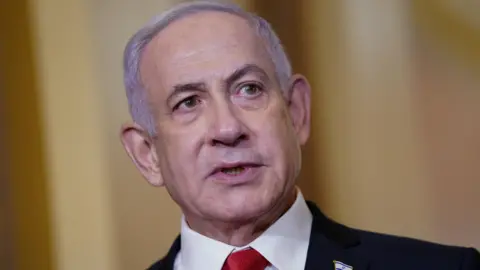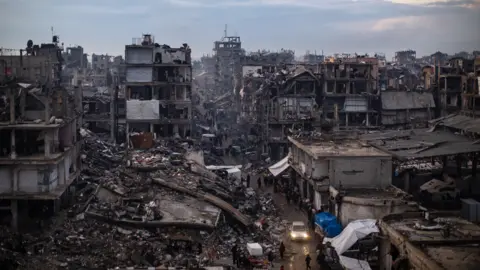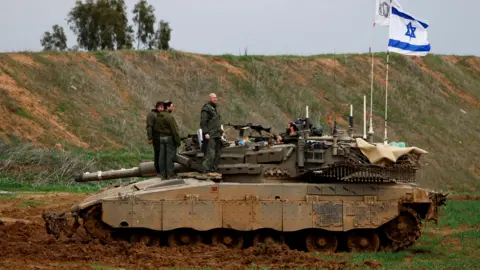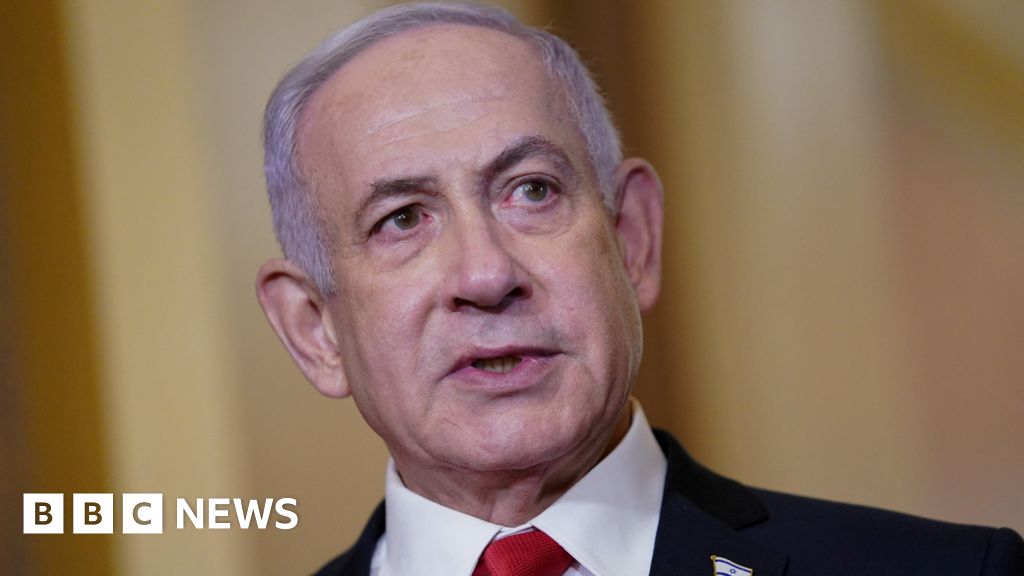BBC Middle East Correspondent
 Reuters
ReutersThere is growing concern that fighting could resume in Gaza after Israel’s prime minister warned Hamas it would end the ceasefire if the Palestinian armed group “does not return our hostages by Saturday”.
Benjamin Netanyahu’s security cabinet met on Tuesday after Hamas said it was postponing freeing more hostages until further notice, claiming Israel had violated the terms of the three-week-old ceasefire deal.
It remains unclear whether Netanyahu is demanding the release of all 76 remaining hostages, or just the three due to be freed this Saturday.
Hamas responded by saying it remained committed to the ceasefire deal and that Israel was “responsible for any complications or delays”.
The group has demanded mediators address its list of complaints against Israel, including blocking vital humanitarian aid such as tents – a claim Israel has denied.
It is understood Arab countries are exerting pressure on Hamas to try to get the deal back on track.
Egypt has said it plans to present a “comprehensive vision” for the reconstruction of Gaza that does not involve displacing the population, unlike a proposal put forward by US President Donald Trump.
Hamas’s decision to delay this weekend’s scheduled release had prompted Trump to propose Israel cancel the agreement altogether and “let hell break out” unless “all of the hostages” were returned by Saturday.
Following a four-hour meeting of Israel’s security cabinet on Tuesday, Netanyahu said in a video statement that he “welcomed President Trump’s demand”.
He added: “In light of Hamas’s announcement regarding its decision to violate the agreement and not release our hostages, last night I instructed the IDF [Israel Defense Forces] to amass forces inside – and surrounding – the Gaza Strip.
“This action is being carried out at this hour and will be completed very soon.”
He then issued an ultimatum that he said had the security cabinet’s unanimous approval.
“If Hamas does not return our hostages by Saturday noon [10:00 GMT], the ceasefire will end, and the IDF will resume intense fighting until the final defeat of Hamas.”
There were conflicting messages from Israeli officials about whether Netanyahu meant Hamas should release all the remaining hostages or not.
One source told the Israeli newspaper Haaretz it would be willing to continue the ceasefire if the next group of three hostages were freed as planned on Saturday.
There were then reports that it was a demand to free the nine living hostages remaining from the first phase of the deal.
But later, transport minister and war cabinet member Miri Regev wrote on X: “We made a very clear decision: we adhere to US President Donald Trump’s statement regarding the release of the hostages – on Saturday, everyone will be released!”
The IDF meanwhile said it had raised the level of readiness of its Southern Command – which is responsible for operations in Gaza – and that it would be reinforced with additional troops, including reservists.
Some Israeli analysts suggest Israel is trying to do a complicated manoeuvre: showing loyalty to the White House and not collapsing the deal.
They say it is still possible Israel and Hamas can reach a compromise through mediators on this weekend’s scheduled round of hostage releases.
 EPA
EPAHamas also reiterated on Tuesday its rejection of Trump’s controversial plan for the US to take over post-war Gaza and permanently relocate the two million Palestinians living there so that it could be rebuilt and turned into the “Riviera of the Middle East”.
Palestinians fear a repeat of the Nakba, or “catastrophe”, when hundreds of thousands fled or were driven from their homes before and during the war that followed the creation of the State of Israel in 1948.
Many of those refugees ended up in Gaza, where they and their descendants make up three quarters of the population. Another 900,000 registered refugees live in the occupied West Bank, while 3.4 million others live in Jordan, Syria and Lebanon, according to the UN.
Hamas said Trump’s remarks were “racist and constitute a call for ethnic cleansing, aimed at liquidating the Palestinian cause and denying our people’s inalienable national rights”.
The Palestinian Authority and Arab states have also categorically rejected the plan, while the UN warned that any forced displacement would be prohibited under international law and “tantamount to ethnic cleansing”.
Netanyahu has praised the president’s “revolutionary vision” for Gaza.
Earlier on Tuesday, senior Hamas official Basem Naim told the BBC that the door was open for US, Qatari and Egyptian mediators to intervene and get the ceasefire deal back on track.
“We don’t wish that this deal will fall apart,” he said. “We are doing the maximum to avoid any obstacles, any challenges, and therefore we are ready to hand over prisoners next Saturday if the situation is rectified through the mediators.”
He accused Israel of “continuous violations” of the ceasefire deal, including delaying the return of displaced Palestinians to areas in northern Gaza by between 48 and 72 hours and obstructing deliveries of urgently needed food, medical and shelter supplies.
 Reuters
ReutersThe first phase of the ceasefire deal is supposed to last six weeks and see a total of 33 Israeli hostages exchanged for about 1,900 Palestinian prisoners and detainees from Gaza.
So far, 16 living hostages have been freed since the ceasefire took effect on 19 January. Hamas has also handed over five Thai hostages outside the terms of the deal.
The 17 other Israeli hostages due to be released during the first phase are two children, one woman, five men over the age of 50, and nine men under 50. They are supposed to be handed over in the next three weeks. Both sides have said eight of these hostages are dead, but only one has been named.
Negotiations for the ceasefire deal’s second phase – which will see the 43 remaining hostages still in captivity released, a full Israeli troop withdrawal and a permanent ceasefire – have not yet begun.
The deal has also seen Israeli forces withdraw from densely populated areas of Gaza, hundreds of thousands of displaced Palestinians return to their homes in the north, and hundreds of aid lorries allowed into the territory each day.
The Israeli military launched a campaign to destroy Hamas in response to an unprecedented cross-border attack on 7 October 2023, in which about 1,200 people were killed and 251 were taken hostage.
More than 48,210 people have been killed in Gaza since then, according to the territory’s Hamas-run health ministry.
Most of Gaza’s population has also been displaced multiple times, almost 70% of buildings are estimated to be damaged or destroyed, the healthcare, water, sanitation and hygiene systems have collapsed, and there are shortages of food, fuel, medicine and shelter.

